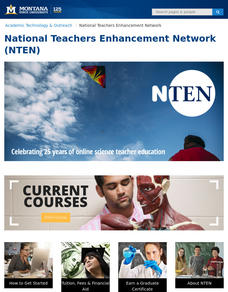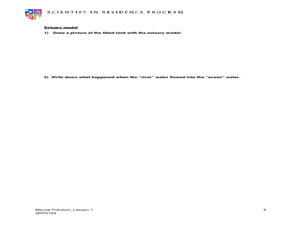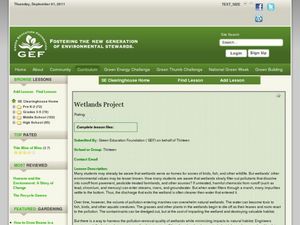Curated OER
The Water Cycle
Students create an "animated" water cycle wheel that illustrates where water comes from and where it goes.
Virginia Department of Education
The Germ Theory and Koch’s Postulates
Explore the history of cholera and its effect on society with your biology class. Young biologists will then proceed to grow their own germs, prepared from live cultures, and follow the steps of the scientific method to generate data....
Curated OER
Droplets and Downpours
Students explore how storm water flows through different habitats by sketching the slope of their yard, compare runoff for erosion, and create a sand castle. In this storm water lesson plan, students measure where their yard started and...
Curated OER
Modeling Estuaries
Students create a model estuary. In this modeling estuaries lesson plan, students identify characteristics and mix water of varying densities. Students form a hypothesis, conduct an experiment, and analyze the results.
Curated OER
It's Really Heating Up in Here!
Students create and observe a greenhouse effect model and discuss the implications of global warming theory for engineers, themselves and the Earth. They discover that Global warming is becoming an increasing concern as we learn more...
Curated OER
Marine & Aquatic Habitats -- Journey of a Drop of Water Through a Watershed
Students discuss pollution and the steps in the hydrologic cycle. They follow a drop of water through a watershed simulation. They discover the components of a water cleaning system as well.
Curated OER
Wetlands in a Pan
Fifth graders explore the wetlands to discover its benefits in removing pollutants in the water. In this wetlands activity, 5th graders discuss how stormwater wetlands are created to purify water. Students test the water.
Curated OER
Oily Oceans
Students are read a book about oceans. They participate in an experiment discovering the effects of oil on water. They discuss different types of pollution and how they can be prevented.
Curated OER
Environmental Science/Water Pollution
Young scholars study natural habitats, aquatic life, renewable and non-renewable resources. They discuss conservation efforts for sea otters and desert toad in this units.
Curated OER
The Urban Explosion
Students investigate the uncontrolled development of the world's major cities. They define key vocabulary terms, view and discuss video excerpts, and complete a project that involves drawing a "perfect city," developing a plan to...
Curated OER
Construction of a Microscale Fuel Cell
Fuel cells are being called the "energy source" of the future. Allow your high school chemistry class to construct a miscroscale fuel cell, complete with all components to generate energy. This engaging activity will allow them to apply...
Curated OER
Dirty Mud
Students examine geological information to study benthic marine habitats. In this watershed project, students examine wetland habitats and land uses in a watershed. They will use geological information to discuss the impact of pollution...
Curated OER
Shedding Light on Watersheds
Students discuss what a watershed is, complete online activities showing them how to take care of a watershed, and create a model of a watershed that they experiment with to see what happens when it is disrupted by civilization.
Curated OER
Watershed Lesson Plan
Students are introduced to the concepts of a watershed, stream flow and water quality. This five-day plan is an excellent way to introduce students to the concepts involved. They create their own watershed using a paper bag, water and...
What affects Frog metamorphosis?
In this lab, students explore pollutants which affect frog metamorphosis using household pollutants (vinegar, oil, and bleach) and sponge capsules.
Curated OER
Break the Tension
Learners experiment with the concepts of surface tension. They participate in a number of different experiments that introduce them to surface tension. They work in a small group in order to conduct these experiments.
Curated OER
Introduction to Dissolved Oxygen and Demonstration of a Simple Test Procedure
Young scholars explain the importance of dissolved oxygen in water ecosystems. They describe the aquatic oxygen cycle and the effect of water pollution on oxygen. They make observations, collect data and draw a conclusion.
Curated OER
Waterwheel Work
Young scholars investigate the history of the waterwheel and common uses for water turbines today. They construct an experimental waterwheel using a two-liter plastic bottle, measure the rate of revolution of a waterwheel, and complete...
Curated OER
What's Hiding in the Air?
Fifth graders conduct experiments to study the effects of invisible air pollutants including one with a bean plant. They examine methods of invisible air pollutants.
Curated OER
Not So Neutral Views
Students explore ways to use indicators to distinguish between acids and bases. They conduct an experiment to model and discuss the harmful effect of acid rain in our living and non-living environment.
Curated OER
Oil Spill
Students explore an important role of environmental engineers by studying the Exxon Valdez oil spill. They experiment with different strategies in order to clean up their own manufactured oil spill.
Curated OER
Waste Not, Want Not
Young scholars consider the types of debris that litters beaches and conduct research on waste management. They then interview professionals in a particular field of waste management and write reports for a booklet about garbage and...
Curated OER
The Solution to Pollution is Dilution
Students consider what happens to herbicides or insecticides that are used in agricultural practices, especially herbicides that are used to control noxious weeds. They become acquaint with a chemical assessment method known as...
Curated OER
Happy the Fish
Students explore the ways in which people's actions affect fish. They discuss pollutants that are in the water. Students define the terms chemicals, cooling pond, and pollutant. They create a book about Happy the Fish.

























